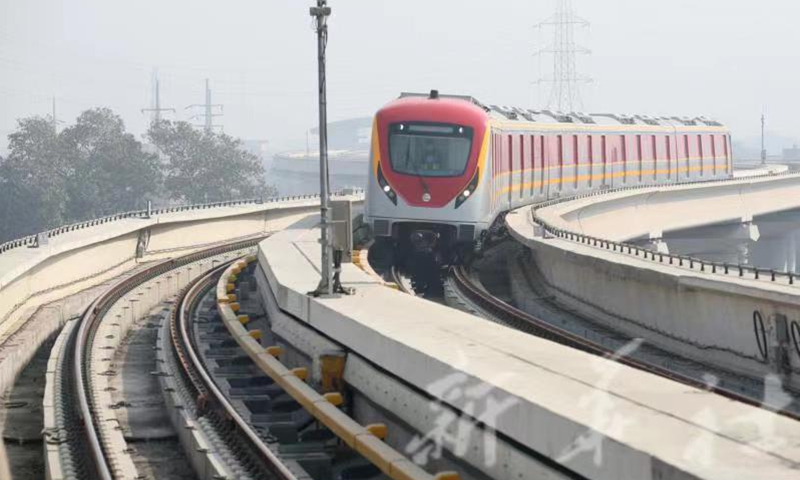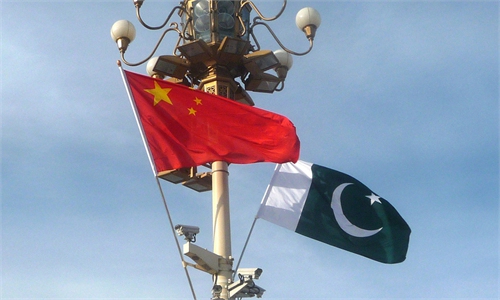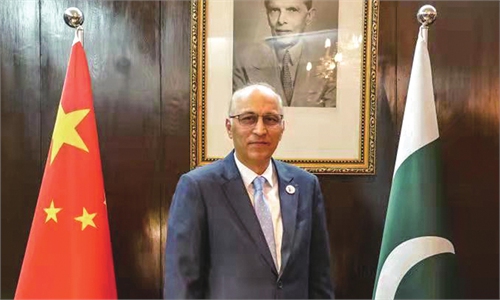Third-country investors eyeing opportunities, joining the China-Pakistan Economic Corridor

Photo taken on October 24, 2020 shows an Orange Line metro train pilot test run in Pakistan's eastern city of Lahore. The Orange Line Metro Train project is one of the CPEC early-harvest projects. Photo: Xinhua
As the China-Pakistan Economic Corridor (CPEC), a flagship project under the China-proposed Belt and Road Initiative (BRI), has created new opportunities for economic growth and stability via a number of projects that are in full swing across the South Asian country, many third-country investors are also showing interest in the project.
Saudi Arabia, United Arab Emirates (UAE) and Germany are among those that have taken moves on the cooperation with Pakistan via the flagship project. As China extends a welcoming attitude toward the investment, it is believed that the CPEC will continue to attract more third-country investors, industry observers told the Global Times.
Brothers Gas, a UAE-based leading liquid gas service provider, will make investment worth $15 million in the CPEC Faisalabad Special Economic Zone, Abdul Razak Dawood, advisor to Pakistani Prime Minister for Commerce and Investment, said in a tweet posted in December.
"The first of the three-phase investment will include the installation of an Aerosol Propellant Gas (APG) plant. The local manufacturing capacity will help reduce Pakistan's reliance on imported APG," Dawood said.
"The actualization of foreign investments is a showing of a conducive business environment which is supported by friendly government policies," Dawood noted.
For Saudi Arabia, its intention to invest in CPEC projects started as early as 2019 when the Middle Eastern country announced plans to set up a $10 billion oil refinery in Pakistan's deep-water port of Gwadar.
After conducting a feasibility study, Aramco, the Saudi energy giant, said it would not be feasible to establish the refinery at Gwadar, according to media reports. There were even speculations that the oil refinery may be shifted from Gwadar to a petrochemical chemical complex somewhere in Balochistan or near Karachi.
"There is no mentionable progress from Aramco as to when and where the deep conversion refinery with the capacity to refine 250,000 barrels per day of crude oil will be set up," Tabish Gauhar, the special assistant to Pakistan's prime minister on power and petroleum, told media in June, according to a report by IANS.
In a recent response sent to the Global Times, Aramco said that it "continues to evaluate attractive investment opportunities in the downstream energy sector of Pakistan, including those associated with the CPEC. Updates on any business milestones will be made as and when appropriate."
"Currently, progress of the petrochemical complex under CPEC is slow due to pandemic and a dip in oil prices that took a heavy toll on Saudi economy," Yasir Habib Khan, founder and president of the Institute of International Relations and Media Research in Pakistan, told the Global Times in a recent interview.
Saudi Arabia and UAE investments are driven by two major motives, according to Khan. "First it aims to help Pakistan to stabilize its economy. Second purpose is to have upper hand in geo-political chessboard particularly against Iran by investing and giving bailout packages to Pakistan."
In December, Pakistan received a $3 billion loan from Saudi Arabia, as part of an economic support package, with the South Asian country facing growing economic challenges, Reuters reported.
In addition to the two Middle Eastern nations, Pakistan is also becoming increasingly attractive to other foreign investors.
Indonesian Ambassador to Pakistan Adam Tugio said in December that a number of Indonesian companies were keen to invest in Special Economic Zones being established under the umbrella of the CPEC. He said that CPEC projects will emerge as a game changer for the entire region facilitating connectivity across Central Asia and western China.
In September, a gloves joint venture between Germany and Pakistan was inaugurated in Allama Iqbal Special Economic Zone near Sahianwala.
"Since the CPEC welcomes foreign investment and Pakistan's ranking in World Bank indicator 2021 has improved from 130 to 72, placing Pakistan at second position in South Asian countries in terms of ease of starting a business, many foreign countries are showing interest to invest in the CPEC," Khan said.
The CPEC has brought Pakistan direct investment totaling $25.4 billion over the past eight years, Ning Jizhe, deputy head of the National Development and Reform Commission, China's top economic planner, said during remarks at the 10th Joint Cooperation Committee meeting of the CPEC in September 2021.
Ning said that the ministry would focus on the corridor's construction, with measures to improve the utilization rate of existing infrastructure and enhance bilateral cooperation in technology, agriculture, among other sectors.


